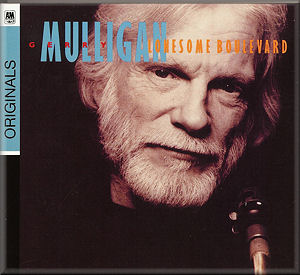1. Rico Apollo
2. I Heard the Shadows Dancing
3. Lonesome Boulevard
4. Curtains
5. Ring around a Bright Star
6. Splendor in the Grass
7. Good Neighbor Thelonious
8. Wallflower
9. The Flying Scotsman
10. Etude for Franca
Gerry Mulligan - Baritone sax
Bill Charlap – Piano
Dean Johnson – Bass
Richie De Rosa – Drums
In 1952 Gerry Mulligan first came into jazz prominence as the leader
of an interesting “pianoless” quartet, which distinguished the aggregation
from virtually all other groups of the period. At the time, Mulligan
explained the omission of the piano as “allowing greater imaginative
freedom” to the players. Over the years, through various iterations
of the quartet, his sextet, and even the Concert Jazz Band, he often
used the “pianoless” format.
Now some four decades later, having solidified his position as the
most influential baritone saxophonist in jazz history, Mulligan transformed
himself from the gruff, extroverted, linear musician into a refined,
less experimental player. He was happy to use the chord-feeding orchestral
capabilities of the piano to support his solo efforts. Lonesome
Boulevard which was originally issued in 1990 and now re-released
as part of the Verve Originals series, showcases Mulligan primarily
in a collection of his own tunes. The exception is David Amram’s Splendor
in the Grass which was originally part of the soundtrack for the
1961 movie of the same name.
From the Mulligan compositions, the set starts off with Rico Apollo,
a samba-flavoured tune which dances along briskly. Never one to abandon
his West Coast roots, Mulligan embraces both Lonesome Boulevard
and Curtains with cool charm. The balance of the disc is divided
between a little bop opus called The Flying Scotsman, a moody
Ellingtonian styled ballad Wallflower, and an upper register
Ring around a Bright Star. Mulligan did not forget his ties
to Thelonious Monk with a playful Good Neighbor Thelonious. The
set concludes with Etude for Franca which was written for his
wife.
It would be appropriate at this point to say a few words about the
young Bill Charlap (23 at the time of this recording) on piano. This
was the album that introduced him to the jazz world and he proved
to be the perfect accompanist for Mulligan. Never obtrusive, his tasteful
chording behind Mulligan’s solos provided the perfect underpinnings
to those efforts. Charlap has gone on to greater acclaim and has assumed
the mantle of the interpreter of the Great American Songbook that
had previously been the domain of the current elder statesman of the
piano Hank Jones and the late Tommy Flanagan.
Finally, Verve Records and the Universal Music Group have done a
fine job with this reissue, although I have one complaint. If UMG
are going to go to the time and expense of a reissue, they should
ensure that the liner notes are up to scratch. In this case they have
overlooked the misspelling of one of Mulligan’s previous pianists,
namely Bill Mays. In one section of the notes the name is spelled
Bill Mayes and in another Billy Mayes (sic). This is a minor point
but annoying nevertheless.
Pierre Giroux
